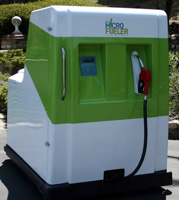 The Cleantech Network is holding yet another forum to give experts in the energy industry a chance to learn the latest tools and technologies of the trade. The CleanTech Forum XVIII will be held in Washington D.C. September 15th -17th, 2008.
The Cleantech Network is holding yet another forum to give experts in the energy industry a chance to learn the latest tools and technologies of the trade. The CleanTech Forum XVIII will be held in Washington D.C. September 15th -17th, 2008.
Explore the best cleantech policies and corporate practices from around the world. Hear from prominent lawmakers on cleantech-related issues. Help influence change. A new U.S. administration will soon be sworn in, and a national American emissions cap and trade system looks likely. First generation biofuels are being blamed for rising worldwide food prices, and scientists worry that the challenge of global warming has been underestimated.
Cleantech Forum XVIII in Washington, D.C. connects North American investors, technology innovators, policymakers and top tier cleantech influencers with their counterparts from Asia, Europe, the Middle East and elsewhere.
More than 20 of the industry’s leading companies will be presenting their value propositions at the event.




 According to Senator Saxby Chambliss of Georgia, the ranking Republican on the Senate Agriculture Committee, the bill invests $320 million for new loan guarantee program for the development and construction of commercial-scale biorefineries; provides $300 million in the Bioenergy Program to provide assistance to biofuel production plants for the purchase of feedstocks; provides $118 million for biomass research and development efforts; reauthorizes and provides $250 million for grants and loan guarantees for renewable energy and energy efficiency projects; and authorizes a new program, the Biomass Crop Assistance Program to help producers transition to new energy crops for biofuel production.
According to Senator Saxby Chambliss of Georgia, the ranking Republican on the Senate Agriculture Committee, the bill invests $320 million for new loan guarantee program for the development and construction of commercial-scale biorefineries; provides $300 million in the Bioenergy Program to provide assistance to biofuel production plants for the purchase of feedstocks; provides $118 million for biomass research and development efforts; reauthorizes and provides $250 million for grants and loan guarantees for renewable energy and energy efficiency projects; and authorizes a new program, the Biomass Crop Assistance Program to help producers transition to new energy crops for biofuel production. Higher food prices have led to increasing calls for changes in the Renewable Fuels Standard (RFS) that was implemented as part the Energy bill just signed into law last December, which calls for 36 billion gallons of annual renewable fuel use by 2022.
Higher food prices have led to increasing calls for changes in the Renewable Fuels Standard (RFS) that was implemented as part the Energy bill just signed into law last December, which calls for 36 billion gallons of annual renewable fuel use by 2022. The National Biodiesel Board is applauding Congress for coming up with a compromise on the Farm Bill today that contains a provision that renews the Commodity Credit Corporation (CCC) Bioenergy program.
The National Biodiesel Board is applauding Congress for coming up with a compromise on the Farm Bill today that contains a provision that renews the Commodity Credit Corporation (CCC) Bioenergy program. A company called
A company called  The home-brewed ethanol maker is the brain child of entrepreneur Tom Quinn and ethanol scientist Floyd Butterfield. They unveiled the machine at a press event Thursday in New York. Quinn says the device, which is about the size of a refrigerator, is so simple to use that anyone can do it. “You just open it like a washing machine and dump in your sugar, close the door and push one button,” he says. “A few days later, you’ve got ethanol.”
The home-brewed ethanol maker is the brain child of entrepreneur Tom Quinn and ethanol scientist Floyd Butterfield. They unveiled the machine at a press event Thursday in New York. Quinn says the device, which is about the size of a refrigerator, is so simple to use that anyone can do it. “You just open it like a washing machine and dump in your sugar, close the door and push one button,” he says. “A few days later, you’ve got ethanol.”  That’s according to the
That’s according to the  Drake University law professor Neil Hamilton, the director of the school’s Agricultural Law Center, has just finished teaching the school’s first class in wind law to eight law school students and three practicing attorneys.
Drake University law professor Neil Hamilton, the director of the school’s Agricultural Law Center, has just finished teaching the school’s first class in wind law to eight law school students and three practicing attorneys. If the pace continues, a total of 5,600 megawatts of generating power will be installed in 2008, eclipsing the record of 5,300 megawatts, according to figures from the American Wind Energy Association.
If the pace continues, a total of 5,600 megawatts of generating power will be installed in 2008, eclipsing the record of 5,300 megawatts, according to figures from the American Wind Energy Association.